Critical Evaluation of Cognitive Behaviour Therapy
VerifiedAdded on 2022/12/30
|9
|2483
|71
Report
AI Summary
This report offers a comprehensive critical evaluation of Cognitive Behaviour Therapy (CBT), a psychosocial intervention aimed at improving mental health. It examines the theory, including its assumptions about how thoughts, feelings, and behaviors are interconnected, and its application to understanding and treating mental health problems, specifically schizophrenia. The report delves into the development of client problems within the CBT framework, outlining the goals of therapy, the therapeutic process, and the outcomes. It evaluates the applicability of CBT to different client types and problems, highlighting its strengths, such as its focus on practical strategies and its effectiveness in managing various disorders, as well as its limitations, including potential time constraints and the need for client engagement. Ethical considerations are addressed, along with empirical evidence supporting the approach's effectiveness. The report concludes with an assessment of the future of CBT within the field of clinical psychology, emphasizing its continued relevance and potential for further development.
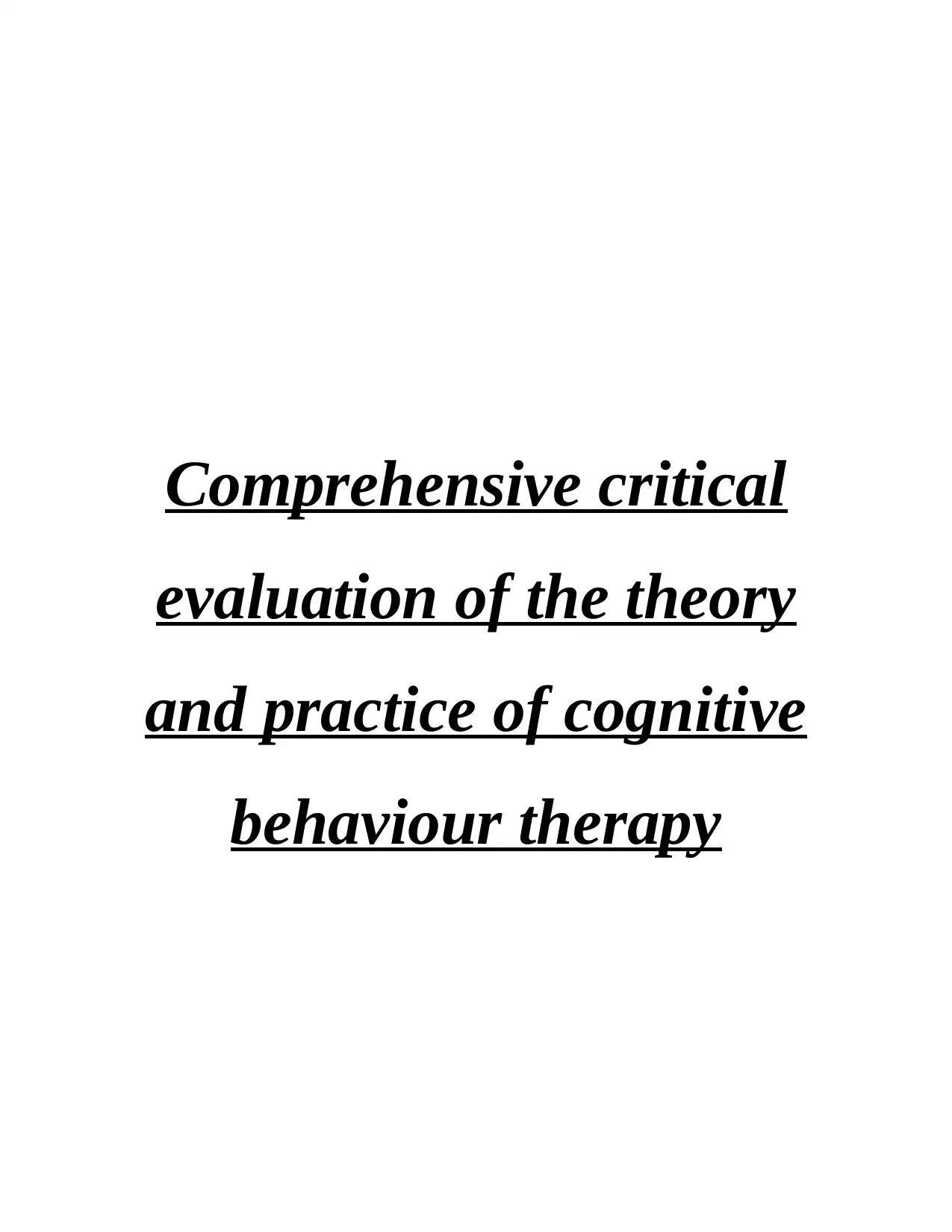
Comprehensive critical
evaluation of the theory
and practice of cognitive
behaviour therapy
evaluation of the theory
and practice of cognitive
behaviour therapy
Paraphrase This Document
Need a fresh take? Get an instant paraphrase of this document with our AI Paraphraser
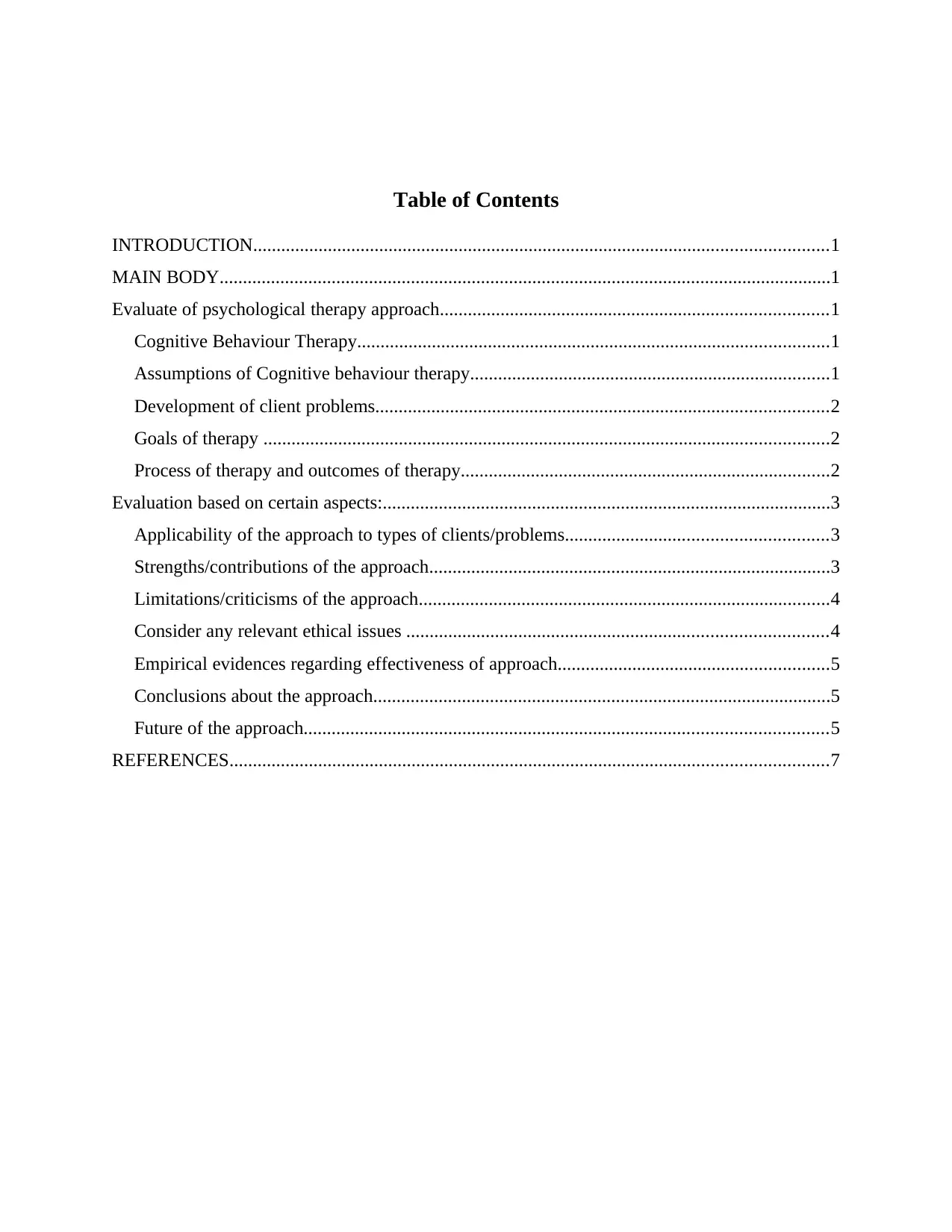
Table of Contents
INTRODUCTION...........................................................................................................................1
MAIN BODY...................................................................................................................................1
Evaluate of psychological therapy approach...................................................................................1
Cognitive Behaviour Therapy.....................................................................................................1
Assumptions of Cognitive behaviour therapy.............................................................................1
Development of client problems.................................................................................................2
Goals of therapy .........................................................................................................................2
Process of therapy and outcomes of therapy...............................................................................2
Evaluation based on certain aspects:................................................................................................3
Applicability of the approach to types of clients/problems........................................................3
Strengths/contributions of the approach......................................................................................3
Limitations/criticisms of the approach........................................................................................4
Consider any relevant ethical issues ..........................................................................................4
Empirical evidences regarding effectiveness of approach..........................................................5
Conclusions about the approach..................................................................................................5
Future of the approach................................................................................................................5
REFERENCES................................................................................................................................7
INTRODUCTION...........................................................................................................................1
MAIN BODY...................................................................................................................................1
Evaluate of psychological therapy approach...................................................................................1
Cognitive Behaviour Therapy.....................................................................................................1
Assumptions of Cognitive behaviour therapy.............................................................................1
Development of client problems.................................................................................................2
Goals of therapy .........................................................................................................................2
Process of therapy and outcomes of therapy...............................................................................2
Evaluation based on certain aspects:................................................................................................3
Applicability of the approach to types of clients/problems........................................................3
Strengths/contributions of the approach......................................................................................3
Limitations/criticisms of the approach........................................................................................4
Consider any relevant ethical issues ..........................................................................................4
Empirical evidences regarding effectiveness of approach..........................................................5
Conclusions about the approach..................................................................................................5
Future of the approach................................................................................................................5
REFERENCES................................................................................................................................7
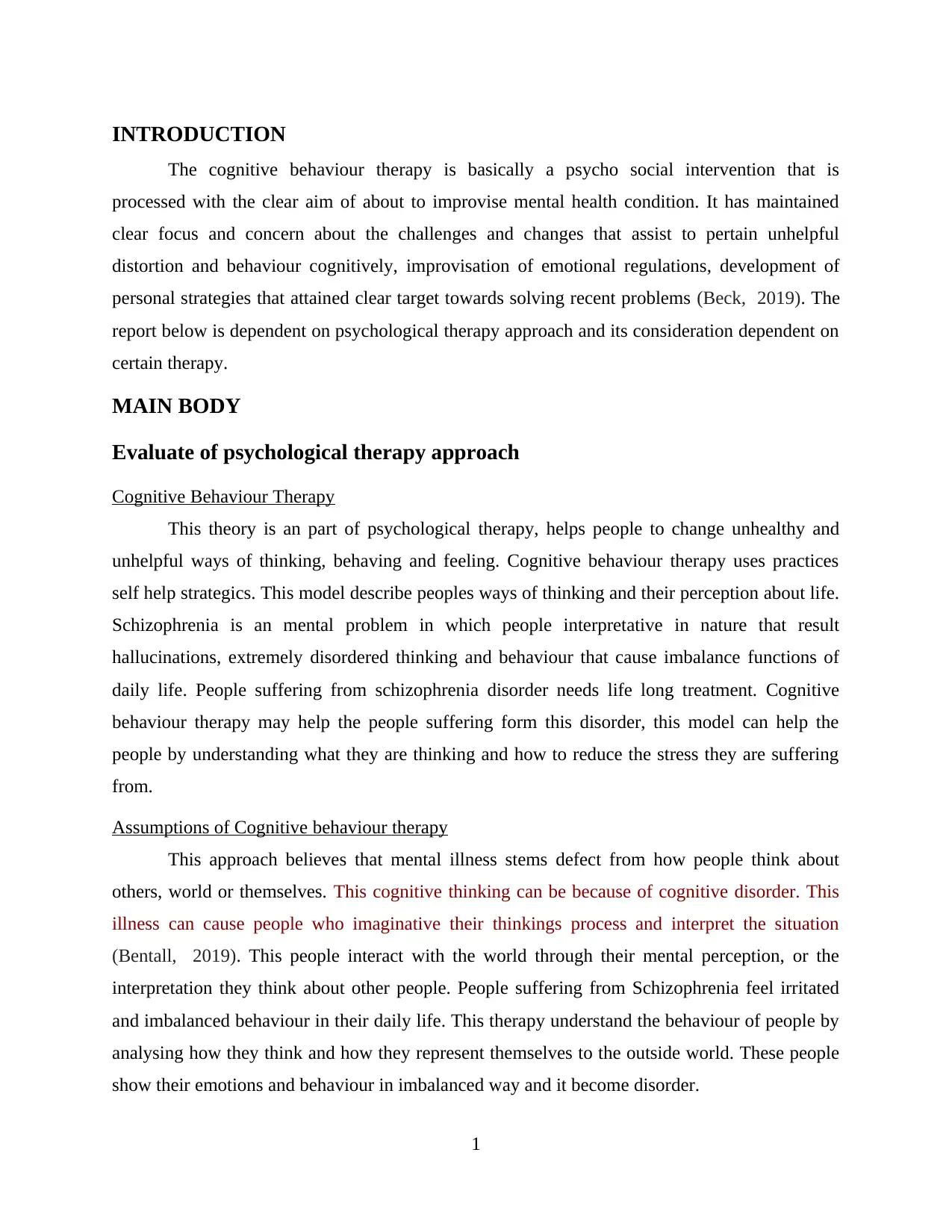
INTRODUCTION
The cognitive behaviour therapy is basically a psycho social intervention that is
processed with the clear aim of about to improvise mental health condition. It has maintained
clear focus and concern about the challenges and changes that assist to pertain unhelpful
distortion and behaviour cognitively, improvisation of emotional regulations, development of
personal strategies that attained clear target towards solving recent problems (Beck, 2019). The
report below is dependent on psychological therapy approach and its consideration dependent on
certain therapy.
MAIN BODY
Evaluate of psychological therapy approach
Cognitive Behaviour Therapy
This theory is an part of psychological therapy, helps people to change unhealthy and
unhelpful ways of thinking, behaving and feeling. Cognitive behaviour therapy uses practices
self help strategics. This model describe peoples ways of thinking and their perception about life.
Schizophrenia is an mental problem in which people interpretative in nature that result
hallucinations, extremely disordered thinking and behaviour that cause imbalance functions of
daily life. People suffering from schizophrenia disorder needs life long treatment. Cognitive
behaviour therapy may help the people suffering form this disorder, this model can help the
people by understanding what they are thinking and how to reduce the stress they are suffering
from.
Assumptions of Cognitive behaviour therapy
This approach believes that mental illness stems defect from how people think about
others, world or themselves. This cognitive thinking can be because of cognitive disorder. This
illness can cause people who imaginative their thinkings process and interpret the situation
(Bentall, 2019). This people interact with the world through their mental perception, or the
interpretation they think about other people. People suffering from Schizophrenia feel irritated
and imbalanced behaviour in their daily life. This therapy understand the behaviour of people by
analysing how they think and how they represent themselves to the outside world. These people
show their emotions and behaviour in imbalanced way and it become disorder.
1
The cognitive behaviour therapy is basically a psycho social intervention that is
processed with the clear aim of about to improvise mental health condition. It has maintained
clear focus and concern about the challenges and changes that assist to pertain unhelpful
distortion and behaviour cognitively, improvisation of emotional regulations, development of
personal strategies that attained clear target towards solving recent problems (Beck, 2019). The
report below is dependent on psychological therapy approach and its consideration dependent on
certain therapy.
MAIN BODY
Evaluate of psychological therapy approach
Cognitive Behaviour Therapy
This theory is an part of psychological therapy, helps people to change unhealthy and
unhelpful ways of thinking, behaving and feeling. Cognitive behaviour therapy uses practices
self help strategics. This model describe peoples ways of thinking and their perception about life.
Schizophrenia is an mental problem in which people interpretative in nature that result
hallucinations, extremely disordered thinking and behaviour that cause imbalance functions of
daily life. People suffering from schizophrenia disorder needs life long treatment. Cognitive
behaviour therapy may help the people suffering form this disorder, this model can help the
people by understanding what they are thinking and how to reduce the stress they are suffering
from.
Assumptions of Cognitive behaviour therapy
This approach believes that mental illness stems defect from how people think about
others, world or themselves. This cognitive thinking can be because of cognitive disorder. This
illness can cause people who imaginative their thinkings process and interpret the situation
(Bentall, 2019). This people interact with the world through their mental perception, or the
interpretation they think about other people. People suffering from Schizophrenia feel irritated
and imbalanced behaviour in their daily life. This therapy understand the behaviour of people by
analysing how they think and how they represent themselves to the outside world. These people
show their emotions and behaviour in imbalanced way and it become disorder.
1
⊘ This is a preview!⊘
Do you want full access?
Subscribe today to unlock all pages.

Trusted by 1+ million students worldwide
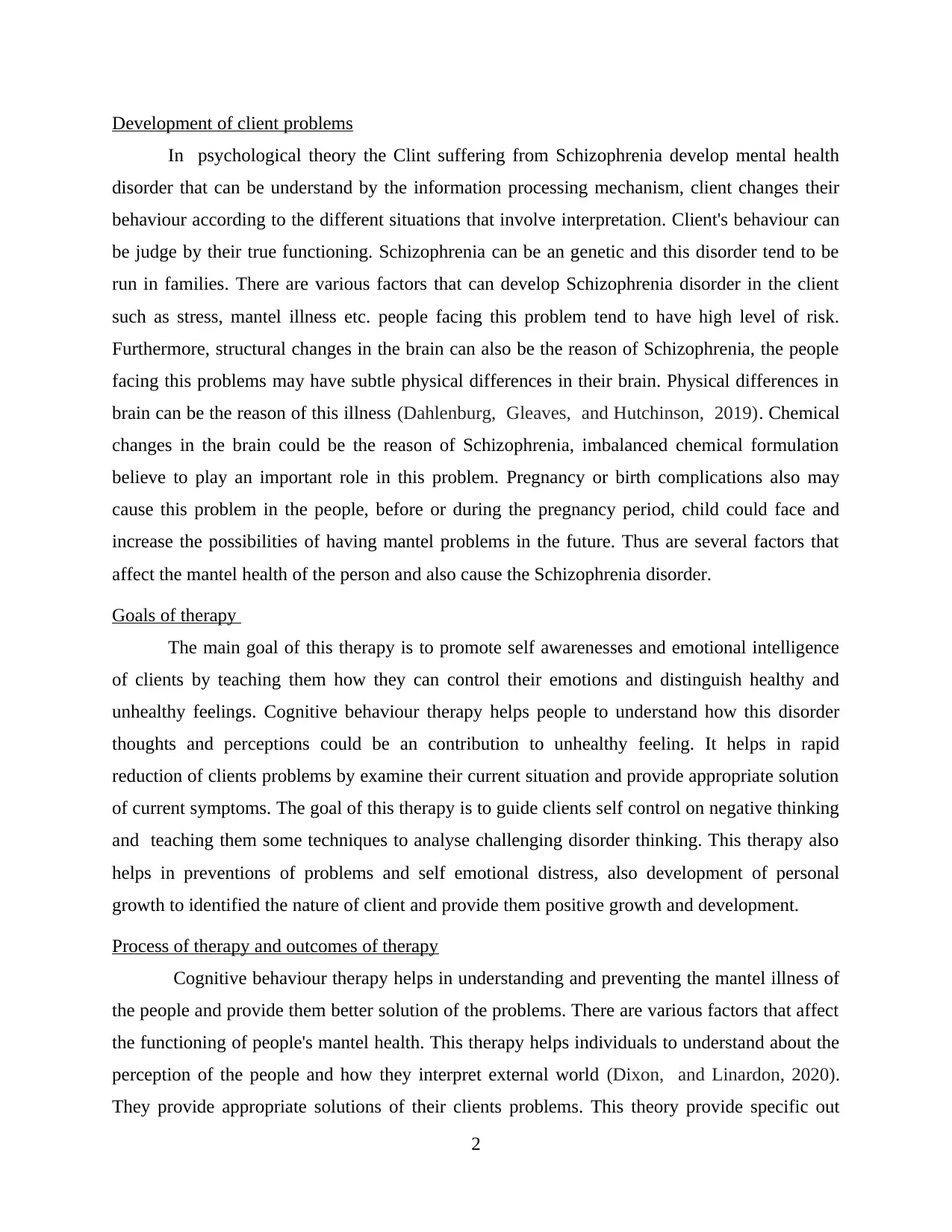
Development of client problems
In psychological theory the Clint suffering from Schizophrenia develop mental health
disorder that can be understand by the information processing mechanism, client changes their
behaviour according to the different situations that involve interpretation. Client's behaviour can
be judge by their true functioning. Schizophrenia can be an genetic and this disorder tend to be
run in families. There are various factors that can develop Schizophrenia disorder in the client
such as stress, mantel illness etc. people facing this problem tend to have high level of risk.
Furthermore, structural changes in the brain can also be the reason of Schizophrenia, the people
facing this problems may have subtle physical differences in their brain. Physical differences in
brain can be the reason of this illness (Dahlenburg, Gleaves, and Hutchinson, 2019). Chemical
changes in the brain could be the reason of Schizophrenia, imbalanced chemical formulation
believe to play an important role in this problem. Pregnancy or birth complications also may
cause this problem in the people, before or during the pregnancy period, child could face and
increase the possibilities of having mantel problems in the future. Thus are several factors that
affect the mantel health of the person and also cause the Schizophrenia disorder.
Goals of therapy
The main goal of this therapy is to promote self awarenesses and emotional intelligence
of clients by teaching them how they can control their emotions and distinguish healthy and
unhealthy feelings. Cognitive behaviour therapy helps people to understand how this disorder
thoughts and perceptions could be an contribution to unhealthy feeling. It helps in rapid
reduction of clients problems by examine their current situation and provide appropriate solution
of current symptoms. The goal of this therapy is to guide clients self control on negative thinking
and teaching them some techniques to analyse challenging disorder thinking. This therapy also
helps in preventions of problems and self emotional distress, also development of personal
growth to identified the nature of client and provide them positive growth and development.
Process of therapy and outcomes of therapy
Cognitive behaviour therapy helps in understanding and preventing the mantel illness of
the people and provide them better solution of the problems. There are various factors that affect
the functioning of people's mantel health. This therapy helps individuals to understand about the
perception of the people and how they interpret external world (Dixon, and Linardon, 2020).
They provide appropriate solutions of their clients problems. This theory provide specific out
2
In psychological theory the Clint suffering from Schizophrenia develop mental health
disorder that can be understand by the information processing mechanism, client changes their
behaviour according to the different situations that involve interpretation. Client's behaviour can
be judge by their true functioning. Schizophrenia can be an genetic and this disorder tend to be
run in families. There are various factors that can develop Schizophrenia disorder in the client
such as stress, mantel illness etc. people facing this problem tend to have high level of risk.
Furthermore, structural changes in the brain can also be the reason of Schizophrenia, the people
facing this problems may have subtle physical differences in their brain. Physical differences in
brain can be the reason of this illness (Dahlenburg, Gleaves, and Hutchinson, 2019). Chemical
changes in the brain could be the reason of Schizophrenia, imbalanced chemical formulation
believe to play an important role in this problem. Pregnancy or birth complications also may
cause this problem in the people, before or during the pregnancy period, child could face and
increase the possibilities of having mantel problems in the future. Thus are several factors that
affect the mantel health of the person and also cause the Schizophrenia disorder.
Goals of therapy
The main goal of this therapy is to promote self awarenesses and emotional intelligence
of clients by teaching them how they can control their emotions and distinguish healthy and
unhealthy feelings. Cognitive behaviour therapy helps people to understand how this disorder
thoughts and perceptions could be an contribution to unhealthy feeling. It helps in rapid
reduction of clients problems by examine their current situation and provide appropriate solution
of current symptoms. The goal of this therapy is to guide clients self control on negative thinking
and teaching them some techniques to analyse challenging disorder thinking. This therapy also
helps in preventions of problems and self emotional distress, also development of personal
growth to identified the nature of client and provide them positive growth and development.
Process of therapy and outcomes of therapy
Cognitive behaviour therapy helps in understanding and preventing the mantel illness of
the people and provide them better solution of the problems. There are various factors that affect
the functioning of people's mantel health. This therapy helps individuals to understand about the
perception of the people and how they interpret external world (Dixon, and Linardon, 2020).
They provide appropriate solutions of their clients problems. This theory provide specific out
2
Paraphrase This Document
Need a fresh take? Get an instant paraphrase of this document with our AI Paraphraser
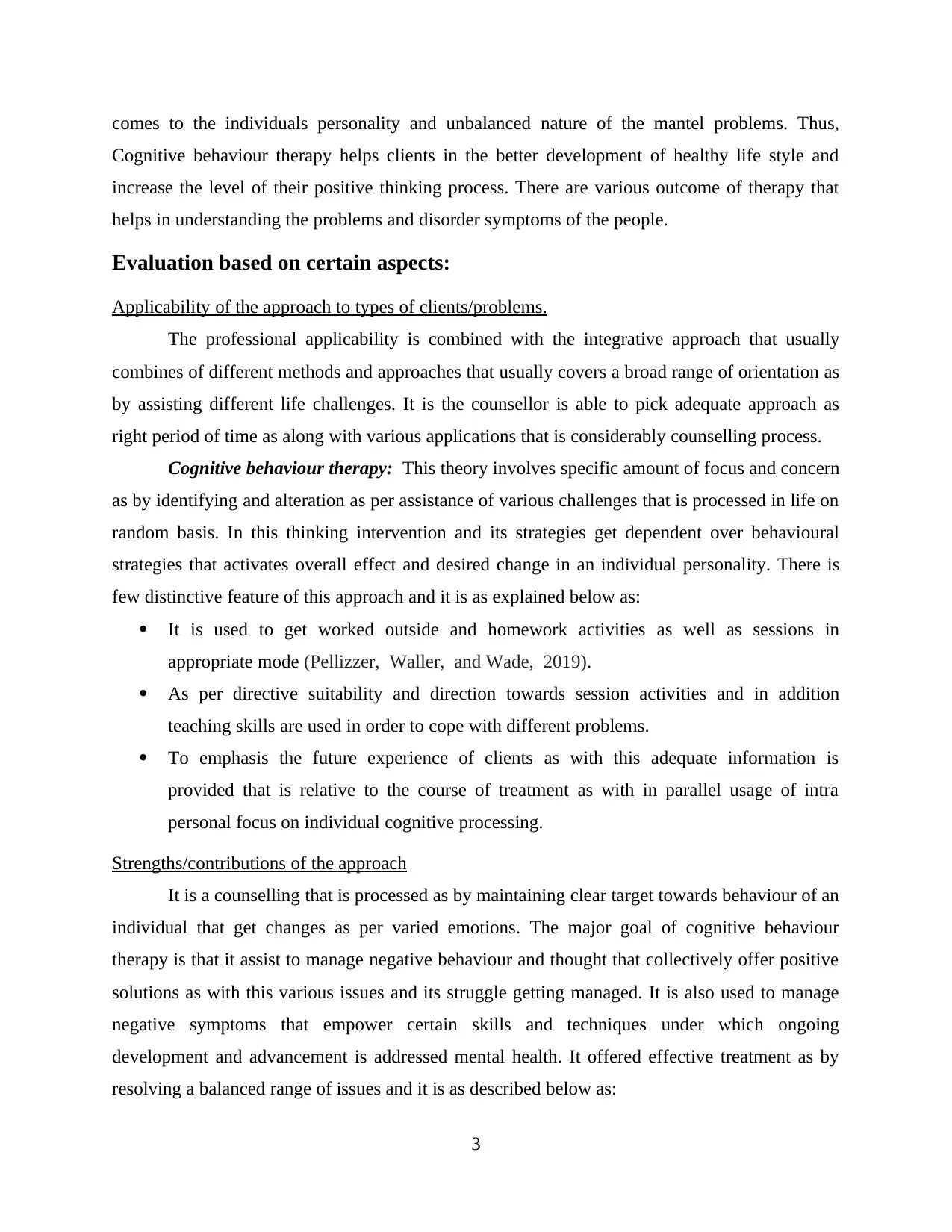
comes to the individuals personality and unbalanced nature of the mantel problems. Thus,
Cognitive behaviour therapy helps clients in the better development of healthy life style and
increase the level of their positive thinking process. There are various outcome of therapy that
helps in understanding the problems and disorder symptoms of the people.
Evaluation based on certain aspects:
Applicability of the approach to types of clients/problems.
The professional applicability is combined with the integrative approach that usually
combines of different methods and approaches that usually covers a broad range of orientation as
by assisting different life challenges. It is the counsellor is able to pick adequate approach as
right period of time as along with various applications that is considerably counselling process.
Cognitive behaviour therapy: This theory involves specific amount of focus and concern
as by identifying and alteration as per assistance of various challenges that is processed in life on
random basis. In this thinking intervention and its strategies get dependent over behavioural
strategies that activates overall effect and desired change in an individual personality. There is
few distinctive feature of this approach and it is as explained below as:
It is used to get worked outside and homework activities as well as sessions in
appropriate mode (Pellizzer, Waller, and Wade, 2019).
As per directive suitability and direction towards session activities and in addition
teaching skills are used in order to cope with different problems.
To emphasis the future experience of clients as with this adequate information is
provided that is relative to the course of treatment as with in parallel usage of intra
personal focus on individual cognitive processing.
Strengths/contributions of the approach
It is a counselling that is processed as by maintaining clear target towards behaviour of an
individual that get changes as per varied emotions. The major goal of cognitive behaviour
therapy is that it assist to manage negative behaviour and thought that collectively offer positive
solutions as with this various issues and its struggle getting managed. It is also used to manage
negative symptoms that empower certain skills and techniques under which ongoing
development and advancement is addressed mental health. It offered effective treatment as by
resolving a balanced range of issues and it is as described below as:
3
Cognitive behaviour therapy helps clients in the better development of healthy life style and
increase the level of their positive thinking process. There are various outcome of therapy that
helps in understanding the problems and disorder symptoms of the people.
Evaluation based on certain aspects:
Applicability of the approach to types of clients/problems.
The professional applicability is combined with the integrative approach that usually
combines of different methods and approaches that usually covers a broad range of orientation as
by assisting different life challenges. It is the counsellor is able to pick adequate approach as
right period of time as along with various applications that is considerably counselling process.
Cognitive behaviour therapy: This theory involves specific amount of focus and concern
as by identifying and alteration as per assistance of various challenges that is processed in life on
random basis. In this thinking intervention and its strategies get dependent over behavioural
strategies that activates overall effect and desired change in an individual personality. There is
few distinctive feature of this approach and it is as explained below as:
It is used to get worked outside and homework activities as well as sessions in
appropriate mode (Pellizzer, Waller, and Wade, 2019).
As per directive suitability and direction towards session activities and in addition
teaching skills are used in order to cope with different problems.
To emphasis the future experience of clients as with this adequate information is
provided that is relative to the course of treatment as with in parallel usage of intra
personal focus on individual cognitive processing.
Strengths/contributions of the approach
It is a counselling that is processed as by maintaining clear target towards behaviour of an
individual that get changes as per varied emotions. The major goal of cognitive behaviour
therapy is that it assist to manage negative behaviour and thought that collectively offer positive
solutions as with this various issues and its struggle getting managed. It is also used to manage
negative symptoms that empower certain skills and techniques under which ongoing
development and advancement is addressed mental health. It offered effective treatment as by
resolving a balanced range of issues and it is as described below as:
3
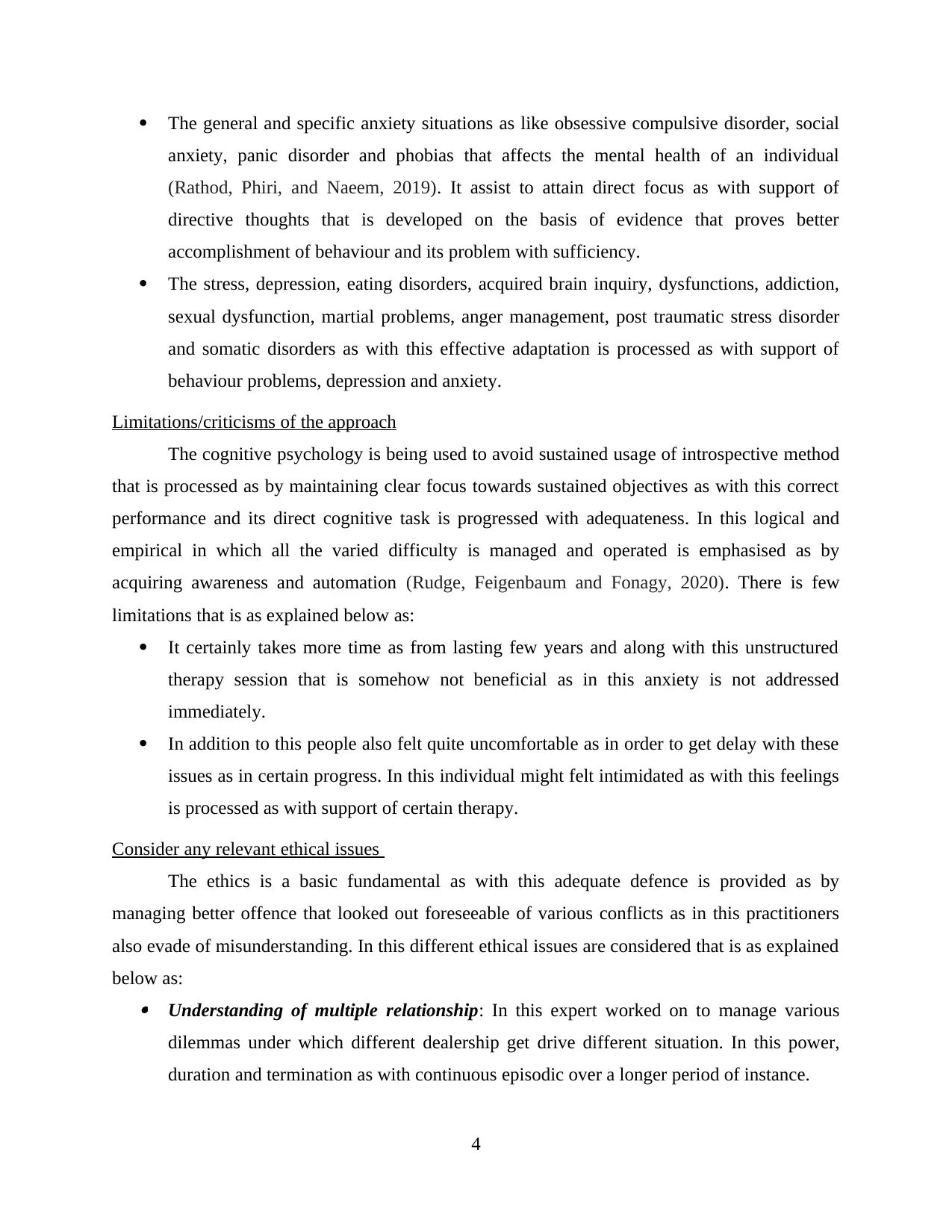
The general and specific anxiety situations as like obsessive compulsive disorder, social
anxiety, panic disorder and phobias that affects the mental health of an individual
(Rathod, Phiri, and Naeem, 2019). It assist to attain direct focus as with support of
directive thoughts that is developed on the basis of evidence that proves better
accomplishment of behaviour and its problem with sufficiency.
The stress, depression, eating disorders, acquired brain inquiry, dysfunctions, addiction,
sexual dysfunction, martial problems, anger management, post traumatic stress disorder
and somatic disorders as with this effective adaptation is processed as with support of
behaviour problems, depression and anxiety.
Limitations/criticisms of the approach
The cognitive psychology is being used to avoid sustained usage of introspective method
that is processed as by maintaining clear focus towards sustained objectives as with this correct
performance and its direct cognitive task is progressed with adequateness. In this logical and
empirical in which all the varied difficulty is managed and operated is emphasised as by
acquiring awareness and automation (Rudge, Feigenbaum and Fonagy, 2020). There is few
limitations that is as explained below as:
It certainly takes more time as from lasting few years and along with this unstructured
therapy session that is somehow not beneficial as in this anxiety is not addressed
immediately.
In addition to this people also felt quite uncomfortable as in order to get delay with these
issues as in certain progress. In this individual might felt intimidated as with this feelings
is processed as with support of certain therapy.
Consider any relevant ethical issues
The ethics is a basic fundamental as with this adequate defence is provided as by
managing better offence that looked out foreseeable of various conflicts as in this practitioners
also evade of misunderstanding. In this different ethical issues are considered that is as explained
below as: Understanding of multiple relationship: In this expert worked on to manage various
dilemmas under which different dealership get drive different situation. In this power,
duration and termination as with continuous episodic over a longer period of instance.
4
anxiety, panic disorder and phobias that affects the mental health of an individual
(Rathod, Phiri, and Naeem, 2019). It assist to attain direct focus as with support of
directive thoughts that is developed on the basis of evidence that proves better
accomplishment of behaviour and its problem with sufficiency.
The stress, depression, eating disorders, acquired brain inquiry, dysfunctions, addiction,
sexual dysfunction, martial problems, anger management, post traumatic stress disorder
and somatic disorders as with this effective adaptation is processed as with support of
behaviour problems, depression and anxiety.
Limitations/criticisms of the approach
The cognitive psychology is being used to avoid sustained usage of introspective method
that is processed as by maintaining clear focus towards sustained objectives as with this correct
performance and its direct cognitive task is progressed with adequateness. In this logical and
empirical in which all the varied difficulty is managed and operated is emphasised as by
acquiring awareness and automation (Rudge, Feigenbaum and Fonagy, 2020). There is few
limitations that is as explained below as:
It certainly takes more time as from lasting few years and along with this unstructured
therapy session that is somehow not beneficial as in this anxiety is not addressed
immediately.
In addition to this people also felt quite uncomfortable as in order to get delay with these
issues as in certain progress. In this individual might felt intimidated as with this feelings
is processed as with support of certain therapy.
Consider any relevant ethical issues
The ethics is a basic fundamental as with this adequate defence is provided as by
managing better offence that looked out foreseeable of various conflicts as in this practitioners
also evade of misunderstanding. In this different ethical issues are considered that is as explained
below as: Understanding of multiple relationship: In this expert worked on to manage various
dilemmas under which different dealership get drive different situation. In this power,
duration and termination as with continuous episodic over a longer period of instance.
4
⊘ This is a preview!⊘
Do you want full access?
Subscribe today to unlock all pages.

Trusted by 1+ million students worldwide
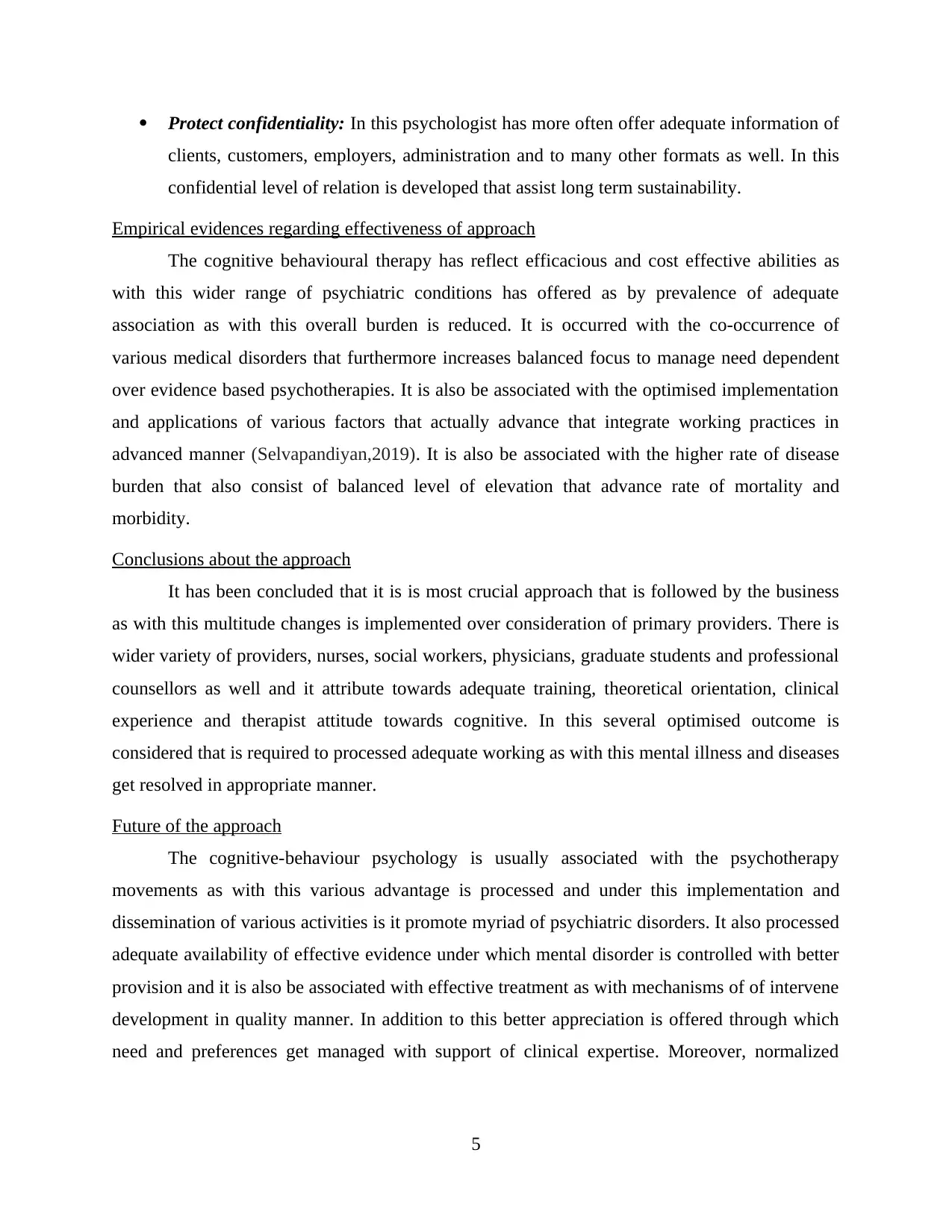
Protect confidentiality: In this psychologist has more often offer adequate information of
clients, customers, employers, administration and to many other formats as well. In this
confidential level of relation is developed that assist long term sustainability.
Empirical evidences regarding effectiveness of approach
The cognitive behavioural therapy has reflect efficacious and cost effective abilities as
with this wider range of psychiatric conditions has offered as by prevalence of adequate
association as with this overall burden is reduced. It is occurred with the co-occurrence of
various medical disorders that furthermore increases balanced focus to manage need dependent
over evidence based psychotherapies. It is also be associated with the optimised implementation
and applications of various factors that actually advance that integrate working practices in
advanced manner (Selvapandiyan,2019). It is also be associated with the higher rate of disease
burden that also consist of balanced level of elevation that advance rate of mortality and
morbidity.
Conclusions about the approach
It has been concluded that it is is most crucial approach that is followed by the business
as with this multitude changes is implemented over consideration of primary providers. There is
wider variety of providers, nurses, social workers, physicians, graduate students and professional
counsellors as well and it attribute towards adequate training, theoretical orientation, clinical
experience and therapist attitude towards cognitive. In this several optimised outcome is
considered that is required to processed adequate working as with this mental illness and diseases
get resolved in appropriate manner.
Future of the approach
The cognitive-behaviour psychology is usually associated with the psychotherapy
movements as with this various advantage is processed and under this implementation and
dissemination of various activities is it promote myriad of psychiatric disorders. It also processed
adequate availability of effective evidence under which mental disorder is controlled with better
provision and it is also be associated with effective treatment as with mechanisms of of intervene
development in quality manner. In addition to this better appreciation is offered through which
need and preferences get managed with support of clinical expertise. Moreover, normalized
5
clients, customers, employers, administration and to many other formats as well. In this
confidential level of relation is developed that assist long term sustainability.
Empirical evidences regarding effectiveness of approach
The cognitive behavioural therapy has reflect efficacious and cost effective abilities as
with this wider range of psychiatric conditions has offered as by prevalence of adequate
association as with this overall burden is reduced. It is occurred with the co-occurrence of
various medical disorders that furthermore increases balanced focus to manage need dependent
over evidence based psychotherapies. It is also be associated with the optimised implementation
and applications of various factors that actually advance that integrate working practices in
advanced manner (Selvapandiyan,2019). It is also be associated with the higher rate of disease
burden that also consist of balanced level of elevation that advance rate of mortality and
morbidity.
Conclusions about the approach
It has been concluded that it is is most crucial approach that is followed by the business
as with this multitude changes is implemented over consideration of primary providers. There is
wider variety of providers, nurses, social workers, physicians, graduate students and professional
counsellors as well and it attribute towards adequate training, theoretical orientation, clinical
experience and therapist attitude towards cognitive. In this several optimised outcome is
considered that is required to processed adequate working as with this mental illness and diseases
get resolved in appropriate manner.
Future of the approach
The cognitive-behaviour psychology is usually associated with the psychotherapy
movements as with this various advantage is processed and under this implementation and
dissemination of various activities is it promote myriad of psychiatric disorders. It also processed
adequate availability of effective evidence under which mental disorder is controlled with better
provision and it is also be associated with effective treatment as with mechanisms of of intervene
development in quality manner. In addition to this better appreciation is offered through which
need and preferences get managed with support of clinical expertise. Moreover, normalized
5
Paraphrase This Document
Need a fresh take? Get an instant paraphrase of this document with our AI Paraphraser
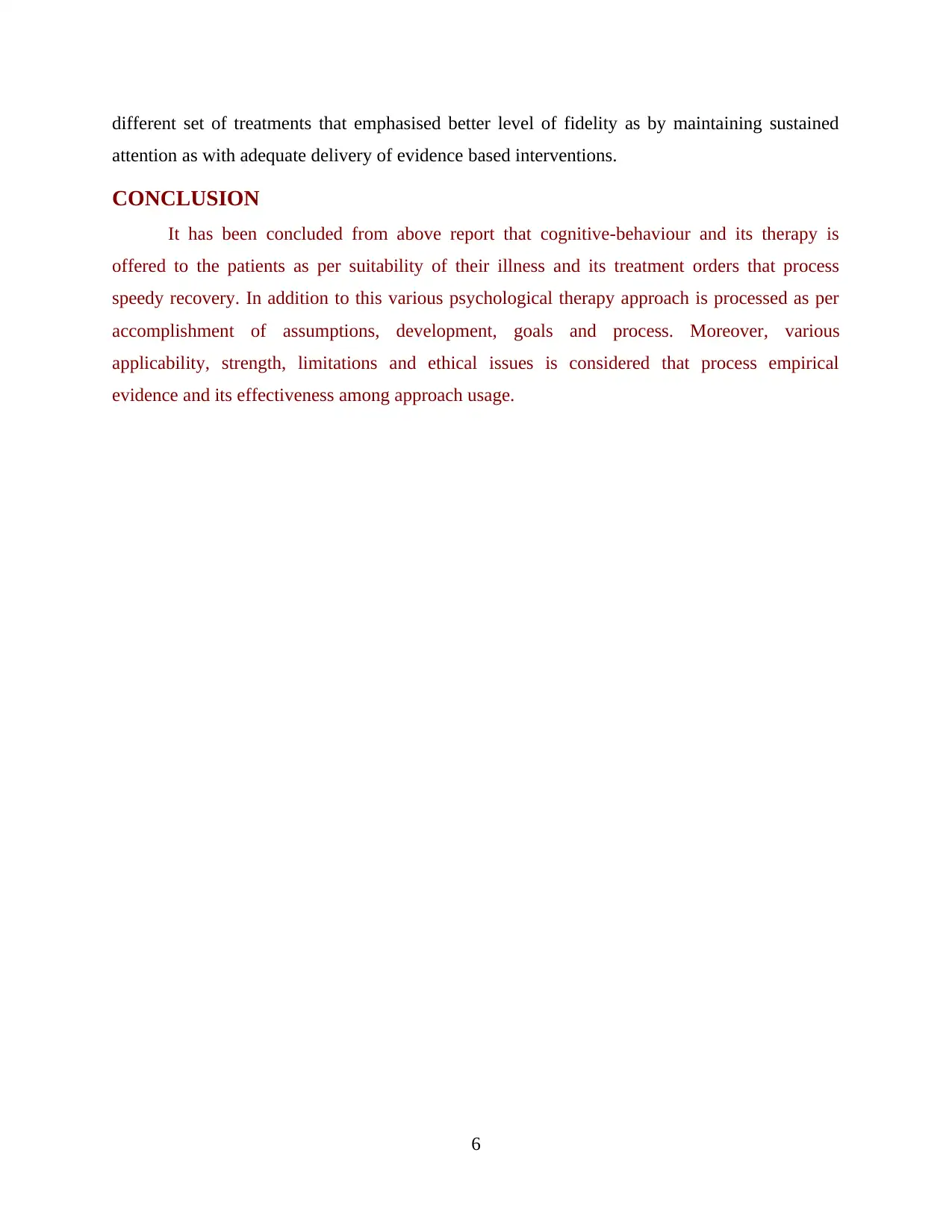
different set of treatments that emphasised better level of fidelity as by maintaining sustained
attention as with adequate delivery of evidence based interventions.
CONCLUSION
It has been concluded from above report that cognitive-behaviour and its therapy is
offered to the patients as per suitability of their illness and its treatment orders that process
speedy recovery. In addition to this various psychological therapy approach is processed as per
accomplishment of assumptions, development, goals and process. Moreover, various
applicability, strength, limitations and ethical issues is considered that process empirical
evidence and its effectiveness among approach usage.
6
attention as with adequate delivery of evidence based interventions.
CONCLUSION
It has been concluded from above report that cognitive-behaviour and its therapy is
offered to the patients as per suitability of their illness and its treatment orders that process
speedy recovery. In addition to this various psychological therapy approach is processed as per
accomplishment of assumptions, development, goals and process. Moreover, various
applicability, strength, limitations and ethical issues is considered that process empirical
evidence and its effectiveness among approach usage.
6
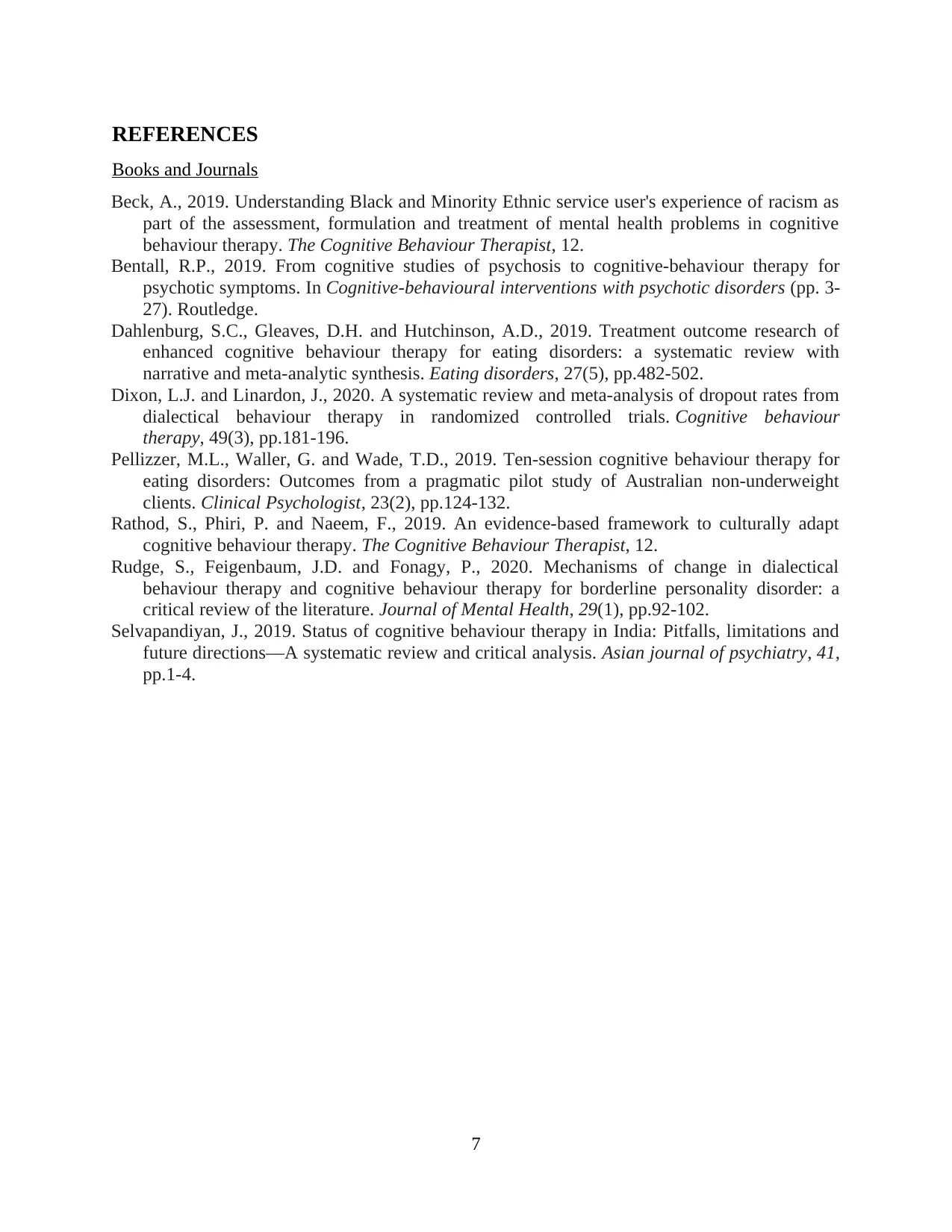
REFERENCES
Books and Journals
Beck, A., 2019. Understanding Black and Minority Ethnic service user's experience of racism as
part of the assessment, formulation and treatment of mental health problems in cognitive
behaviour therapy. The Cognitive Behaviour Therapist, 12.
Bentall, R.P., 2019. From cognitive studies of psychosis to cognitive-behaviour therapy for
psychotic symptoms. In Cognitive-behavioural interventions with psychotic disorders (pp. 3-
27). Routledge.
Dahlenburg, S.C., Gleaves, D.H. and Hutchinson, A.D., 2019. Treatment outcome research of
enhanced cognitive behaviour therapy for eating disorders: a systematic review with
narrative and meta-analytic synthesis. Eating disorders, 27(5), pp.482-502.
Dixon, L.J. and Linardon, J., 2020. A systematic review and meta-analysis of dropout rates from
dialectical behaviour therapy in randomized controlled trials. Cognitive behaviour
therapy, 49(3), pp.181-196.
Pellizzer, M.L., Waller, G. and Wade, T.D., 2019. Ten‐session cognitive behaviour therapy for
eating disorders: Outcomes from a pragmatic pilot study of Australian non‐underweight
clients. Clinical Psychologist, 23(2), pp.124-132.
Rathod, S., Phiri, P. and Naeem, F., 2019. An evidence-based framework to culturally adapt
cognitive behaviour therapy. The Cognitive Behaviour Therapist, 12.
Rudge, S., Feigenbaum, J.D. and Fonagy, P., 2020. Mechanisms of change in dialectical
behaviour therapy and cognitive behaviour therapy for borderline personality disorder: a
critical review of the literature. Journal of Mental Health, 29(1), pp.92-102.
Selvapandiyan, J., 2019. Status of cognitive behaviour therapy in India: Pitfalls, limitations and
future directions—A systematic review and critical analysis. Asian journal of psychiatry, 41,
pp.1-4.
7
Books and Journals
Beck, A., 2019. Understanding Black and Minority Ethnic service user's experience of racism as
part of the assessment, formulation and treatment of mental health problems in cognitive
behaviour therapy. The Cognitive Behaviour Therapist, 12.
Bentall, R.P., 2019. From cognitive studies of psychosis to cognitive-behaviour therapy for
psychotic symptoms. In Cognitive-behavioural interventions with psychotic disorders (pp. 3-
27). Routledge.
Dahlenburg, S.C., Gleaves, D.H. and Hutchinson, A.D., 2019. Treatment outcome research of
enhanced cognitive behaviour therapy for eating disorders: a systematic review with
narrative and meta-analytic synthesis. Eating disorders, 27(5), pp.482-502.
Dixon, L.J. and Linardon, J., 2020. A systematic review and meta-analysis of dropout rates from
dialectical behaviour therapy in randomized controlled trials. Cognitive behaviour
therapy, 49(3), pp.181-196.
Pellizzer, M.L., Waller, G. and Wade, T.D., 2019. Ten‐session cognitive behaviour therapy for
eating disorders: Outcomes from a pragmatic pilot study of Australian non‐underweight
clients. Clinical Psychologist, 23(2), pp.124-132.
Rathod, S., Phiri, P. and Naeem, F., 2019. An evidence-based framework to culturally adapt
cognitive behaviour therapy. The Cognitive Behaviour Therapist, 12.
Rudge, S., Feigenbaum, J.D. and Fonagy, P., 2020. Mechanisms of change in dialectical
behaviour therapy and cognitive behaviour therapy for borderline personality disorder: a
critical review of the literature. Journal of Mental Health, 29(1), pp.92-102.
Selvapandiyan, J., 2019. Status of cognitive behaviour therapy in India: Pitfalls, limitations and
future directions—A systematic review and critical analysis. Asian journal of psychiatry, 41,
pp.1-4.
7
⊘ This is a preview!⊘
Do you want full access?
Subscribe today to unlock all pages.

Trusted by 1+ million students worldwide
1 out of 9
Related Documents
Your All-in-One AI-Powered Toolkit for Academic Success.
+13062052269
info@desklib.com
Available 24*7 on WhatsApp / Email
![[object Object]](/_next/static/media/star-bottom.7253800d.svg)
Unlock your academic potential
Copyright © 2020–2026 A2Z Services. All Rights Reserved. Developed and managed by ZUCOL.




